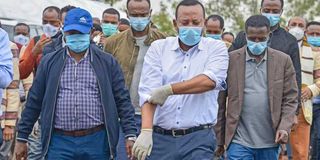Ogaden rebels remnants threaten Ethiopia’s historic peace

Ethiopia’s Prime Minister Abiy Ahmed (in white shirt) during a tree-planting ceremony in Hawassa on June 5. He signed a peace deal with the Ogaden National Liberation Front two years ago. PHOTO | AFP
What you need to know:
- A group of activists told the Nation this week that violence is being targeted at members of particular clans in the region.
- Dheere was an ally of Omer until the latter endorsed the formation of the Prosperity Party, fronted by Abiy, to replace the Ethiopian People’s Revolutionary Democratic Front.
When the Ogaden National Liberation Front (ONLF) agreed to stop violence in August 2018, it looked like a turning point in Ethiopia’s history.
Its remnants are now being accused of dismantling the very structures of the deal. A group of activists told the Nation this week that violence is being targeted at members of particular clans in the region.
“The administrations of the districts of Erer and Nogobalong are encouraging armed attacks on the Dini Haji,” said Mohamud Farah, a clan elders.
UNIFY CLANS
Dini Haji is a sub-clan of Shekhaal, one of the estimated 33 Somali clans and their subsets in the region.
“It is the remnants of ONLF that are fighting President Mustafa Muhumed Omer, who has tried to unify the clans,” Farah said, referring to an incident in May in which at least 12 people died.
Omer became president after Abdi Illey – real name Abdi Mohamud Omar – was forced to step down and replaced by Ahmed Shide in acting capacity.
When Shide was appointed federal minister in 2018, Omer took over. Omar is in jail awaiting trial for atrocities, among them killing Omer’s brother as their father watched.
As an ally of Ethiopian PM Abiy Ahmed, Omer is seen as clan-neutral and could change the imbalance of leadership that was dominated by Ogadenis.
“He has not taken sides and the ONLF remnants are not happy. They expected him to keep sidelining the Shekhaal and other clans,” the elder said.
Ethiopia’s Somali state is the second-largest federal region in the country.
POLITICAL PARTY
There is no current information on population and clan sizes but a 2007 census showed there were about 4.5 million people in the state, some 97 per cent of them Somalis.
The region used to be called Ogaden until its name was changed to Somali. Other major clans are Shekhaal and Isaak.
The ONLF had been waging an armed struggle against Ethiopia since 1983. The peace deal fronted by Abiy meant the terrorist tag on ONLF would be lifted. The group would be transformed into a political party.
Sheekh Ibrahim Dheere, vice-president of United for Democracy Freedom Party, one of the outfits with representatives in the local legislative council, said the violence is not state-sanctioned.
“This conflict is ethnic. The situation is better than before because ONLF does not have any militia and is a legal political party. The violence in Sahalad was between two clans that do not belong to ONLF,” he said.
Dheere was an ally of Omer until the latter endorsed the formation of the Prosperity Party, fronted by Abiy, to replace the Ethiopian People’s Revolutionary Democratic Front.
SURRENDERED ARMS
After the peace deal, some 2,000 fighters surrendered their arms in exchange for a government programme to gradually rope them into mainstream security forces or civil service.
Omer was selected by the local legislative council as vice-chairman of the Somali Democratic Party in August 2018.
ONLF denies violating the peace agreement. In a statement on its Twitter page last week, the group accused Addis Ababa of going against its pledges.
“Ending a war and bringing peace and stability takes time to achieve while losing peace is easy. Expecting one side to adhere to the terms while the other keeps ignoring them is not tenable. The federal government should rethink how it deals with the ONLF,” the statement said.
Additional reporting by Tefsa Alem-Tekle





